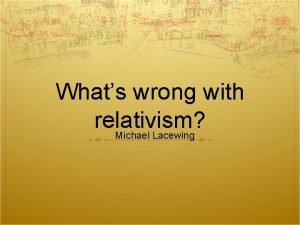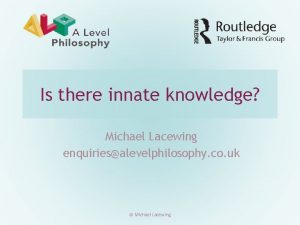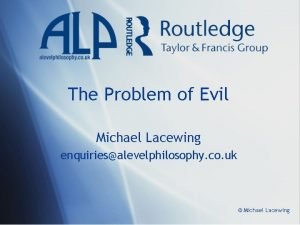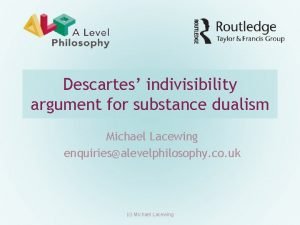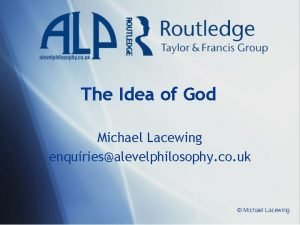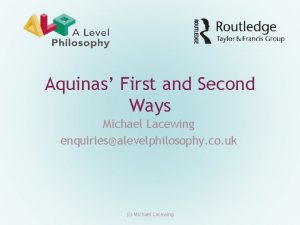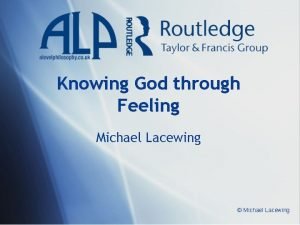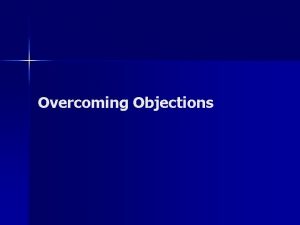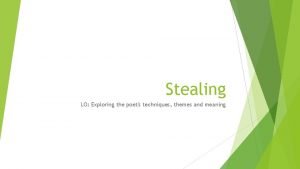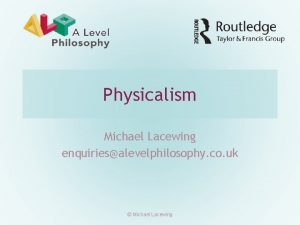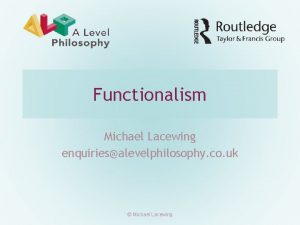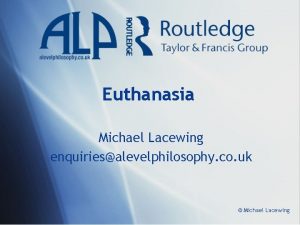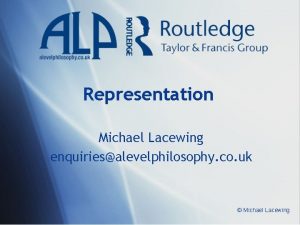Stealing Michael Lacewing enquiriesalevelphilosophy co uk Michael Lacewing









- Slides: 9

Stealing Michael Lacewing enquiries@alevelphilosophy. co. uk © Michael Lacewing

Stealing • Steal: to take someone else’s property with no intention of returning it and without their permission (or without the legal right to do so) • To own property involves a system of rights – We are free to use our property, but others are not • Stealing is a matter of justice, what we are ‘owed’ by right • So assume that stealing is wrong – but always? © Michael Lacewing

Utilitarianism • Act utilitarianism: an action is right if it maximises happiness, and wrong if it does not • So if stealing, on some occasion, creates greater happiness than not stealing, then it is morally right on that occasion. – Usually, it causes greater unhappiness, so usually, it is wrong. – Stealing in dire need, esp. from someone wealthy – Robin Hood: stealing back property that was unjustly taken – Stealing to prevent harm © Michael Lacewing

Utilitarianism • A society in which people stealing was permitted whenever it increased happiness could indirectly lead to greater unhappiness – Lack of trust • Mill: justice is ‘most sacred and binding part of all morality’ – So don’t violate people’s rights for some other purpose – But what about previous examples? © Michael Lacewing

Rule utilitarianism • An action is right if, and only if, it complies with those rules which, if everybody followed them, would lead to the greatest happiness (compared to any other set of rules). • Should we have rules allowing property in the first place? – This is irrelevant to whether stealing is right, since stealing presupposes that property exists – That a world without property would be happier doesn’t justify stealing • Should the rule be ‘Do not steal’ or more complicated, allowing exceptions? © Michael Lacewing

Kantian deontology • ‘Act only on that maxim through which you can at the same time will that it should become a universal law’ – Stealing can only be the right thing to do if everyone could do it. • If everyone stole whatever they wanted, property rights would disappear, so it would be impossible to steal – ‘To steal what I want’ cannot be universalised – So stealing is wrong © Michael Lacewing

Kantian deontology • Can some maxims involving stealing be universalised, e. g. ‘To steal to save a life’? – Still involves stealing, so wrong? – ‘To save a life, even if by stealing’ – the kind of action is saving a life • ‘Act in such a way that you always treat humanity, whether in your own person or in the person of any other, never simply as a means, but always at the same time as an end’ – Stealing involves not allowing someone to make an informed choice (just ask them) © Michael Lacewing

Aristotelian virtue ethics • Stealing concerns justice, and Aristotle understands justice in deontological terms – Stealing is never in the mean • What about stealing in an unjust situation? – It depends how the unjust situation came about – If it is not the result of unjust action, but simply unfortunate, stealing is hard to justify, since it is an unjust action (which is worse) – If the situation is the result of unjust action, then perhaps stealing is ‘justice in rectification’ • Can stealing be ‘in the mean’, e. g. when not trying to deprive anyone of their fair share? © Michael Lacewing

A final thought • Property rights are not absolute – I can’t do anything I want with my property, e. g. I can’t start a fire with my books inside a cinema, I can’t withhold tax… • To steal from someone, they must legitimately own what you steal • If the laws of property are not just, then is stealing unjust? © Michael Lacewing
